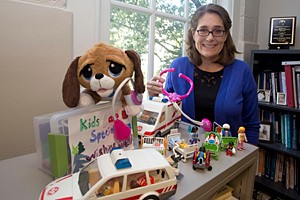
Play Promotes Emotional Healing in Children Battling Serious Illnesses
New research finds that chronically ill children celebrate a successful recovery. Its through their imaginative play with medically themed toys.
Laura Nabors, an associate professor of human services in the University of Cincinnati College of Education, Criminal Justice, and Human Services (CECH), will present new research on Tuesday, Nov. 5, at the American Public Health Associations (APHA) 141st Annual Meeting and Expo in Boston.
The project primarily focused on chronically ill children and their siblings who were staying at the Ronald McDonald House in Cincinnati. The children were provided with medically themed toys such as stethoscopes, miniature hospital beds, ambulances, doctors bags and intravenous (IV) lines, as well as head and arm casts.
The UC researchers would observe the children at play, up to two times a month. They found that through play, the children were working through fears and expressing a full recovery. No one in the dramatizations died, but in some cases, siblings would want to be sick, too, so that they could receive attention from their parents, says Nabors.
Other findings from the service research found that children were fearful of having blood drawn believing that it was something that was taken away, Nabors says, and not aware that the body replenishes its blood supply. Some children dramatized their stories by depicting doctors as being evil, says Nabors, adding that play might be an avenue for opening up communication about fears between medical professionals, parents and very young patients.
The researchers also found that in observing the children in play settings, patients in the childrens dramatizations often called for parental support, indicating that children heavily relied on their parents in coping with their illness.
The project focused on:
- 5 children with medical illnesses
- 14 siblings of children with a medical illness
- 6 children in a comparison group of all family members in good health
The children, between 2 and 10 years old, were videotaped (with cameras recording only hands and toy arrangements) in at least one of seven different weekend play sessions at a Ronald McDonald House where the children with illnesses and siblings of children with illnesses were living.
Three of the children were awaiting surgery to address birth defects; two were having surgeries related to craniofacial anomalies; five were planning intestinal surgery; two had cancer; one child was awaiting a kidney transplant; one child was awaiting multiple procedures to address Wiskott-Aldrich Syndrome (a rare condition resulting in immune deficiency); and one child was awaiting multiple surgeries related to Mitochondrial Disease (which results in neuromuscular disease).
The researchers also observed 14 siblings (7 boys and 7 girls) of children with chronic illnesses who were living in the Ronald McDonald House. The siblings ranged from 3-to-10 years old.

Laura Nabors
Nabors says that among siblings, there were instances when their play indicated that they felt left out of the attention of their parents as they focused on their child who was ill. These instances included expressions of loneliness and needs for attention. However, play among both the chronically ill and the play of the siblings would end with stories of a successful recovery.
I really believe that young children are marked for resilience and that will be explored in our future research, says Nabors.
In addition, a comparison group of 6 children (3 boys and 3 girls) ages 6-to-8 children of families who had no chronically ill children participated in the study. Their play was dramatically different, without rich play experiences and themes indicating that they were working through traumatic experiences, says Nabors.
The service-research project was a partnership among the UC School of Human Services and Cincinnatis Ronald McDonald House.
Other researchers on the project were Kenneth Woodson, a UC doctoral student in health promotion and education; Jennifer Bartz, a recent graduate of UCs psychology program (McMicken College of Arts and Sciences); Rebecca Elkins, a UC graduate student in health promotion and education; and Rebecca Sievers, a graduate student in the UC counseling program.
The presentation follows an article on the research that was published in the September issue of the journal, Issues in Comprehensive Pediatric Nursing.
Related Stories
IMPACT Innovation at IDD Education center celebrates milestone
April 11, 2025
The IDD Education Center’s IMPACT Innovation program celebrates a major milestone as associate Haley secures a position at Adrian Durban Florist. Through hands-on training, mentorship, and community partnerships, IMPACT Innovation helps adults with autism develop independence, communication, and workplace skills. Haley’s mother shares how the program has supported her daughter's growth, while program director Genna Kieper highlights the role of job coaching in Haley’s success. Adrian Durban Florist, a long-time partner, continues to be a champion. The IDD Education Center remains committed to expanding employment opportunities for individuals with disabilities.
UC Journalism to host Hall of Fame, Young Alumni Awards
Event: April 24, 2025 6:00 PM
The College of Arts and Sciences’ journalism department will host the Hall of Fame and Young Alumni Awards to celebrate the achievements and accomplishments of its graduates. Induction into the UC Journalism Hall of Fame is a special honor reserved for UC alumni who have excelled in the profession of journalism and media, or individuals who have made a significant contribution to journalism at UC.
Bradford pear trees look pretty, smell awful. Why are they...
April 2, 2025
WLWT talks to UC biology Professor Theresa Culley about Ohio's ban on the sale or planting of nonnative and invasive pear trees. The trees are showing up in many parks and wild areas where they are crowding out native species.
